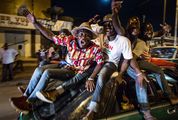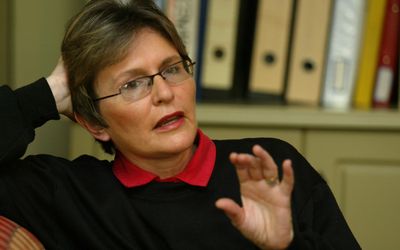POLITICS in South Africa, as in most vibrant democracies, has been characterised in the past 20 years by often robust disagreement among political parties, with temperatures tending to rise as elections near.
One fundamental issue they seem agreed on, however, is funding of political parties: that private funders should remain private, at least until the state provides parties with "enough money".
As the May 7 elections draw closer and big parties embark on their expensive campaigns, the public knows little about who funds whom, a situation that raises many questions and a great deal of suspicion.
Some say almost all of the biggest scandals that have occurred in South Africa since 1994 have in some way been a result of the lack of party funding regulations.
With the exception of the soon to be extinct Independent Democrats (ID), which is now in the process of finalising its merger with the country’s main opposition party, the Democratic Alliance (DA), parties seem reluctant to reveal their donors, perhaps fearing that current and potential funders will shy away if their identities are revealed.
Crucially, some observers believe that revealing donors could in some instances also expose corrupt relationships between big business and political parties.
A case in point was the revelation by former African National Congress (ANC) MP and arms deal critic Andrew Feinstein in his book, After the Party.
He alleged that the ANC’s 1999 election campaign was in part funded by the proceeds of bribes paid in the controversial multibillion-rand arms-procurement process.
Unlike countries such as the US and UK, South Africa does not have legislation or regulations governing private party funding and this has been seen by some analysts as a recipe for encouraging corrupt practices.
In 2011, Parliament stymied an opposition proposal that aimed to enact legislation regulating the private funding of political parties. The portfolio committee on private members’ bills and special petitions ruled that the proposal by ID MP Lance Greyling would, if passed into law, be unconstitutional as it would violate parties’ rights to privacy and possibly freedom of association.
Interestingly, both the United Nations anticorruption convention and African Union standards call for transparency and regulation of political-party financing. Civil society has been calling for South Africa to regulate private funding of parties in line with AU, the UN and other anticorruption codes South Africa has signed.
In a recent opinion piece on the party funding, Hamadziripi Tamukamoyo, a researcher at the governance, crime and justice division at the Institute of Security Studies, said as long as private contributions to political parties were kept hidden and unregulated, it was possible for narrow private interests, such as those of corporations and wealthy individuals, to exercise undue influence over parties, to the detriment of the wider electorate.
The recent failed merger between the DA and Mamphela Ramphele’s fledgling political outfit, Agang SA, undoubtedly highlighted the influence funders have on the political trajectory of South Africa.
DA leader Helen Zille revealed that many donors had demanded her party and Agang SA merge so they could mount a stronger challenge against the ruling ANC.
"It was not only one donor that put pressure on Mamphela. It was every donor. They want a united, strong opposition," Ms Zille was quoted as saying after the brief marriage of the two parties had unravelled. She did not confirm who the mystery donors were.
Independent political analyst Nic Borain says the secrecy surrounding political party funding is effectively undemocratic. "It is no longer about the will of the people, but the will of the donor."
He says that as long as there is no transparency regarding the private funding of political parties, there will always be suspicion about the operations of parties in South Africa.
An ideal scenario would be that parties receive most of their money from taxpayers, he says. "In that way it can be controlled and more democratic … parties should still be allowed to raise funds elsewhere but it should be transparent."
South Africa is one of the few countries in Africa that provides public funding for political parties and the money channelled to the parties is closely monitored and regulated.
However, this money is regarded as inadequate, and in most instances is seen as consolidating the dominance of the ANC.
South African parties represented in Parliament and in the provincial legislatures receive funding from taxpayers in line with the proportion of votes they receive in elections.
This funding is regulated by the Public Funding of Represented Political Parties Act.
The administration of the Represented Political Parties Fund is placed in the hands of the chief electoral officer under the oversight of the Electoral Commission (IEC).
In the 2012-13 financial year, the ANC, as the party with the greatest number of seats in Parliament, received R69m of the R104.8m set aside for all 14 political parties that qualify for funding.
The notice for the 2013-14 financial year as published in the Government Gazette last year increased the allocation for all political parties to R114.8m — but this, according to the Institute of Security Studies, is relatively small change compared with what some parties could receive from private sources.
Analysts postulate that the allocation of funds to political parties has in many ways led to the ANC consolidating its dominance at the expense of relatively smaller parties. They highlight the huge disparity between the amounts of public money allocated to the ANC and other parties such as the DA.
The public funding model for political parties also means new entrants such as the Economic Freedom Fighters — which struggled to raise the deposit required by the IEC to contest the May 7 elections — will invariably be at a disadvantage.
Political parties are required to pay a deposit of R45,000 per province they contest, and R200,000 to contest the national poll. The IEC retains the deposits of parties that do not gain a seat in elections.
DA CEO Jonathan Moakes says his party’s policy remains unchanged, and it seeks to protect the confidentiality of donors. Mr Moakes says the current political landscape in South Africa means that if parties reveal their donors, they run the risk of losing funding, which will also harm South Africa’s democracy as parties will fail to operate effectively.
He says that while the DA has received enormous financial support from locals, the party is unable to compete with the ANC in terms of raising funds.
The IEC needs to review its current funding for political parties as the current system reinforces the status quo and the ANC’s dominance, Mr Moakes says, but this should not be at the expense of the taxpayer, as "South Africans are already contributing a lot to political parties".
The ANC has in the past said it will continue to reject the growing calls for parties to reveal their donors, and the state should give political parties enough money to campaign and to run their affairs.





















Change: -0.47%
Change: -0.57%
Change: -1.76%
Change: -0.34%
Change: 0.02%
Data supplied by Profile Data
Change: -1.49%
Change: 0.08%
Change: -0.47%
Change: 0.00%
Change: -0.04%
Data supplied by Profile Data
Change: -0.13%
Change: -0.05%
Change: -0.06%
Change: -0.37%
Change: 0.23%
Data supplied by Profile Data
Change: -0.39%
Change: -0.32%
Change: -0.07%
Change: 0.35%
Change: 0.57%
Data supplied by Profile Data